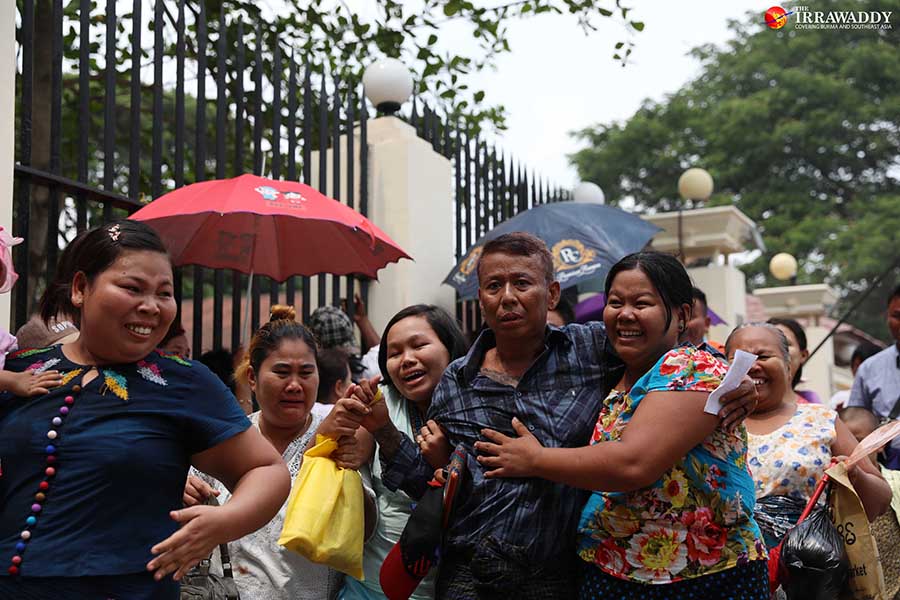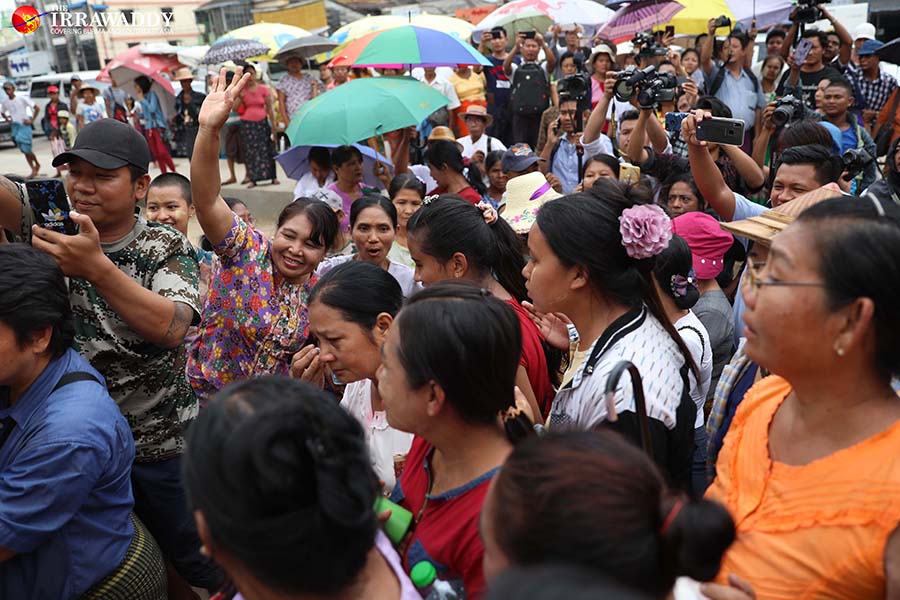Dozens of political prisoners including two Reuters journalists, members of ethnic armed organizations and civilians accused of being affiliated with the EAOs were among 6,520 prisoners released in a third round of presidential pardons on Tuesday.
News of the third and final round of releases associated with Myanmar’s traditional New Year, which fell on April 18 this year, was hailed across many sectors of society.
According to a statement announcing the May 7 presidential amnesty, the prisoners were released “without condition” as part of the Myanmar New Year and to help smooth the peace building process and national reconciliation.
From April 18 to May 7, President U Win Myint pardoned 23,019 prisoners, many of them convicted of violating drug laws, in particular drug convicts who were especially young or old.
The amnestied prisoners also included the two Reuters journalists Wa Lone and Kyaw Soe Oo, who were convicted in September 2018 of violating the Official Secrets Act in relation to their coverage of the Rakhine conflict. Also freed were 27 members of three EAOs: the Shan State Progressive Party (SSPP), the Restoration Council of Shan State (RCSS) and the All Burma Students’ Democratic Front (ABSDF), according to U Zaw Htay, the spokesman for the President’s Office.
U Zaw Htay told reporters in Loikaw, the capital of Kayah State, on Tuesday that Ko Wa Lone and Ko Kyaw Soe Oo “were released in the best interest of the future of the country” after the State Counselor and the President received letters from their families at a meeting between media practitioners and the government, legislators and members of the judiciary in Naypyitaw on April 30.
“Ko Wa Lone and Ko Kyaw Soe Oo were released as they opted against any further appeal [to the Chief Justice] after losing their appeal to the Naypyitaw Supreme Court [on April 23],” said U Tate Naing, the secretary of the Assistance Association for Political Prisoners (AAPP).
He said the release of the journalists and other political prisoners was great news, as the AAPP had lobbied consistently for their release, and for an end to the practice of using charges such as the Official Secrets Act against journalists.

“This is a belated action by the government and Myanmar benefits little from this action,” said Ko Aung Zaw, the editor-in-chief of The Irrawaddy, regarding the release of the Reuters journalists, “but still good news.”
“If the government released them last year, it would have been much better,” he said, adding that they should not have been jailed in the first place.
He added, “The crackdown on the media is intensifying these days—this is also a worrying trend.”
Media professionals in Myanmar have faced prosecution under various charges. Under the current government there have been 31 complaints brought against the media and currently 47 journalists are facing trial, the majority of them under the Telecommunications Act, according to Athan, a Yangon-based group that promotes freedom of expression. Just this week, the editor of a publication based in Sittwe, Rakhine State was sued under the Unlawful Association Act.
The RCSS requested the release of a total of 15 people—some of whom are civilians and some of whom are members of the group—through its peace implementation committee, according to spokesman Lieutenant-Colonel Sai Meng.
Among them, eight farmers from Hopong in Shan State were released: They were arrested on July 18, 2017 and accused of being affiliated with the RCSS and sentenced four to 10 years’ imprisonment under the Communication Law, Export and Import Law, Arms Act and State Protection Act on Feb. 26 of last year.
For the sake of peace and reconciliation
Government spokesman U Zaw Htay, who is also a key peace negotiator, said the government released 27 people from the EAOs’ prisoner lists as part of peace and national reconciliation efforts, after the National Reconciliation and Peace Center (NRPC) received requests from the three EAOs. The RCSS, SSPP and ABSDF sent lists comprising a total of 30 people believed to be in prison. The government scrutinized the lists and released 23, saying the rest were no longer in prison.
Two ABSDF members, U Aung Swe Oo and U Maung Oo, were sentenced to two years in prison on April 11. They were arrested on Nov. 30 last year and charged under the Unlawful Association Act’s Article 17(1) after traveling to a conflict zone in Mohnyin Township, Kachin State to attend the funeral of a member of their organization. This is the second time the ABSDF has benefited from a presidential pardon; group member U Min Htay faced the same charge and sentence in Kachin State. He was arrested in December 2016, charged in 2017 and released the same year.
The AAPP secretary said that among the discharged were two boys—Mai Cho Min Htwe (aka Aik Yen) and Sai Aik Lone. They were released from Hnget Aw San Youth Rehabilitation Center in Yangon’s Kawhmu Township, commonly known as the “children’s prison”, on Tuesday.

Mai Cho Min Htwe, a student from Namhsam Township in Shan State, was arrested in Oct. 5, 2017 and sentenced to two years’ detention under Article 17(1) of the Unlawful Association Act on Oct. 30 of that year for an alleged affiliation with the Ta’ang Nationalities Liberation Army. Sai Aik Lone from a village in southern Shan State was arrested in 2016 and convicted in 2018 under Article 17(1).
Four women from Mandalay who advocated for land rights were also released from Obo Prison in Mandalay, according to the AAPP. Land-rights activists Daw Mya Sint, Hnin Hayman Win, Ma Htay and Ma Chaw Su were arrested on June 18, 2018 and sentenced to one year and six months’ imprisonment under Section 505(b) (incitement) of the Penal Code on Feb. 25, 2019.
Notably absent from Tuesday’s amnesty list were Rakhine politician Dr. Aye Maung and author Ko Wai Hin Aung. They appealed to a higher court after the District Court of Sittwe on March 19 sentenced them to 20 years in prison for high treason and another two years for defamation, to be served concurrently. They were arrested in January last year for remarks they made earlier that month at an event in Rathaetaung Township commemorating the 233rd anniversary of the fall of the Arakan Kingdom to the Burmese in 1785, and prosecuted in September.
According to U Tate Naing, the amnesties will bring a much-needed improvement to the prison situation by reducing the prisoner population, which currently far exceeds capacity. Myanmar’s prisons were built to house some 62,000 inmates but currently hold more than 120,000 people, half of them drug inmates, he said.
There are more than 300 activists currently facing trial under various charges, including Article 66(d) of the Telecommunications Law, and 17(1) and 17(2) of the Unlawful Association Act, according to the AAPP.
In 2016, the NLD government included people facing trial in the amnesty, something former president U Thein Sein once did as well, so those who are currently facing charges should also be acquitted soon, U Tate Naing said.
As long as new charges are brought against journalists, political activists and local residents in conflict zones, the cycle of jailing political prisoners and releasing them under pardons will continue, he said.

















